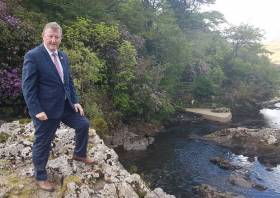Displaying items by tag: National Salmonid Index Catchment
Research Vital As International Year Of The Salmon Highlights Challenges To Iconic Species, Says Canney
Sean Canney, Minister of State with responsibility for the inland fisheries resource, visited the River Erriff in Co Mayo recently to understand more about the current issues facing Ireland’s salmon.
Inland Fisheries Ireland (IFI) has designated the River Erriff, one of Ireland's premier salmon and sea trout fisheries, as the National Salmonid Index Catchment.
Salmon and sea trout migrating upstream in the Erriff must pass through fish counting and trapping facilities located at Aasleagh Falls, where the Erriff flows into Killary Harbour.
Since 1985, salmon and sea trout smolts and kelts migrating downstream pass through a trap located below Tawnyard Lough.
The facilities at this research station are used for a wide range of scientific research and monitoring activities on the salmonid populations and their migratory behaviour.
Minister Canney met with Dr Ciaran Byrne, CEO of Inland Fisheries Ireland, who outlined that fisheries managers and scientists have been concerned for a number of years about the declining numbers of salmon returning to the Irish coast — a key concern in this International Year of the Salmon.
In the mid-1970s, almost 1.7 million salmon were estimated to have returned to Ireland, compared to only some 250,000 today.
Salmon are a key indicator species and they tell us so much about the health of our aquatic environment, IFI says.
And the issue is not unique to Ireland, as populations over the entire southern part of the North East Atlantic — which includes France, Spain, England, Scotland and southern Iceland — have declined significantly in the past number of decades.
Following the visit, Minister Canney commented: “Salmon are an iconic fish species in Ireland. They have always had a special place in Irish culture, heritage and mythology with stories such as the ‘Salmon of Knowledge’ familiar to generations of our school children.
“While they are widely distributed throughout Irish river systems, with over 140 designated salmon rivers, the numbers of salmon returning to Irish rivers, in common with salmon rivers internationally, have shown a worrying decline in recent decades.
“Today they remain an important resource to many people, playing an invaluable ecological, social and cultural role in Ireland and across the Northern Hemisphere.
“International Year of the Salmon offers us an opportunity to start an important conversation around how we can protect, conserve and restore salmon populations in Irish and international waters and how we can inspire action.
“I am delighted to see the excellent research facility here in the Erriff. I am assured that the ongoing scientific research by IFI adds to our understanding of the issues facing salmon and will inform Ireland’s position as part of the EU delegation in discussions which will shortly take place at Nasco — the North Atlantic Salmon Conservation Organisation — on this important topic.”
























































